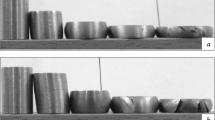Conclusions
-
1.
The ultimate strength of steels Kh18N10T and 000Kh20N16AG6 in biaxial tension increases from 80–90 to 172–180 kg/mm2 with a drop of temperature from room temperature to 77°K and remains unchanged at 20–4.2°K. The elongation remains constant at 77°K (10.5–12.5%) and decreases to 5.8–8.5% at 4.2°K.
-
2.
More martensite is formed in biaxial tension than in uniaxial tension at the same degree of deformation.
Similar content being viewed by others
Literature cited
M. V. Zinov'ev et al., Problemy Prochnosti, No. 5 (1972).
P. O. Pashkov, Ductility and Failure of Metals [in Russian], Sudpromgiz, Leningrad (1950).
V. Ya. Il'ichev et al., in: Strength and Ductility of Metals and Alloys [in Russian], Naukova Dumka, Kiev (1968), p. 78.
Additional information
Physicotechnical Institute of Low Temperatures, Academy of Sciences. Translated from Metallovedenie i Termicheskaya Obrabotka Metallov, No. 5, pp. 22–24, May, 1973.
Rights and permissions
About this article
Cite this article
Il'ichev, V.Y., Savva, S.P. & Skibina, L.V. Mechanical properties of austenitic steels in biaxial tension at low temperatures. Met Sci Heat Treat 15, 382–384 (1973). https://doi.org/10.1007/BF01166649
Issue Date:
DOI: https://doi.org/10.1007/BF01166649




